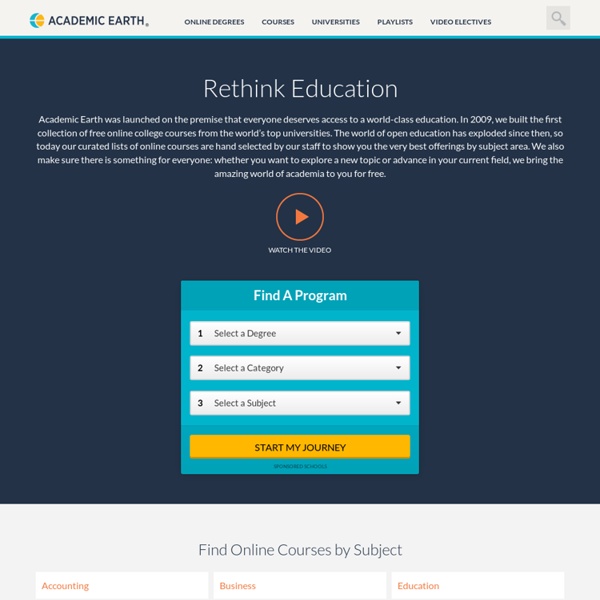free university lectures - computer science, mathematics, physics, chemistry
Whether your goal is to earn a promotion, graduate at the top of your class, or just accelerate your life, lectures can help get you there. Our archives of lectures cover a huge range of topics and have all been handpicked and carefully designed by experienced instructors throughout the world who are dedicated to helping you take the next step toward meeting your career goals. Lifelong learns can turn their free time turn into self-improvement time. The online lectures on this list are more than lecture notes or a slideshow on a topic -- they were designed for audiences like you, with carefully sequenced themes and topics taught by veteran educators, and often with additional resources for your own independent study. The lectures are available to anybody, completely free of charge.
The World Seen From Rome
Father Cantalamessa's 5th Lent Homily 2014 St. Gregory the Great: The Spiritual Understanding of the Scriptures
Top 10 Universities With Free Courses Online
#1 UC Berkeley Ranked as the #1 public school in the United States, Berkeley offers podcasts and webcasts of amazing professors lecturing. Each course has an RSS feed so you can track each new lecture. For printable assignments and notes you can check the professors homepage, which is usually given in the first lecture or google his name.
Harvard Open learning initiative
At Harvard Extension School, free and open learning is hardly a new concept. In fact, the Extension School was founded with this mission in mind: to create an affordable way for any motivated student to take courses at Harvard. We stay true to this mission today, offering several free courses and nearly 800 for-credit courses at reasonable tuition rates. Explore our series of free or low-cost courses below. In addition, you can also browse Harvard University's Digital Learning Portal, which features online learning content from across the University, both free and fee-based options. Video accessibility.
Sequences
A sequence is a series of multiple posts on Less Wrong on the same topic, to coherently and fully explore a particular thesis. Reading the sequences is the most systematic way to approach the Less Wrong archives. If you'd like an abridged index of the sequences, try XiXiDu's guide, or Academian's guide targeted at people who already have a science background.
How to Read Literature Critically - Information, Facts, and Links
Introduction Even if you’re taking your very first literature class, it’s easy to read critically if you follow our 6-step method. But before you get started, always keep this in mind: reading critically doesn’t mean tearing a work of literature apart. Instead, it means understanding what the author has written and evaluating the success of the work as a whole. 1) Figurative language. As you are reading, make note of expressive language such as similes, metaphors, and personification.
Summa Theologica Index
Sacred Texts Christianity Aquinas Buy this Book at Amazon.com Contents Start Reading This is St.
250 Free Online Courses from Top Universities
Advertisment Take online courses from the world’s top universities for free. Below, you will find 1,700 free online courses from universities like Yale, MIT, Harvard, Oxford and more.
News: From Classic to Modern
"Fortune favors the bold” is one of those phrases that are quoted so frequently that they bear none of the weight of their original contexts. The appeal of its underlying message — luck is not something that merely happens to people, but rather the other way around — ignores the fact that it was originally written, by the Roman poet Virgil, as the battle cry of a fool whose boldness shortly leads to his death. There is a pause on the phone line as Richard Thomas, a professor of classics at Harvard University, attempts to locate the original passage.
Recap Resource
Lord of the Flies by William Golding Brown Girl Dreaming I Can't Write This Essay! 60second Recap® Classic literature, books for teens, and more.
Aristotle's Ethics
First published Tue May 1, 2001; substantive revision Mon Mar 29, 2010 Aristotle conceives of ethical theory as a field distinct from the theoretical sciences. Its methodology must match its subject matter—good action—and must respect the fact that in this field many generalizations hold only for the most part. We study ethics in order to improve our lives, and therefore its principal concern is the nature of human well-being. Aristotle follows Socrates and Plato in taking the virtues to be central to a well-lived life. Like Plato, he regards the ethical virtues (justice, courage, temperance and so on) as complex rational, emotional and social skills.
Take Any College Class for Free: 236 Open Courseware Collections
Written by: Thomas Broderick Universities, colleges, and private organizations offer free online college courses to help students acquire new knowledge and skills. These courses cover a variety of traditional academic topics and other subjects that can lead to career advancement and personal enrichment.
Breaking a Vicious Cycle That Undermines Student Success
Students who struggle with their work at the high school level are quickly identified by parents and teachers because producing work—such as term papers, essays, quizzes, homework, and projects—is the way that learning is assessed. It’s hard for a teacher to know what or if a student is learning when there is no tangible product coming in to be reviewed or graded. Working as a school psychologist in a high school setting for the past several years has given me the opportunity to notice something about many of the students who don’t turn in assignments: They are often stuck in a cycle that involves a pernicious interaction of three overlapping cognitive processes: sustained attention, working memory, and anxiety or stress. When students have a problem with one or, more typically, all of these functions, it’s hard for them to produce. Three Examples



